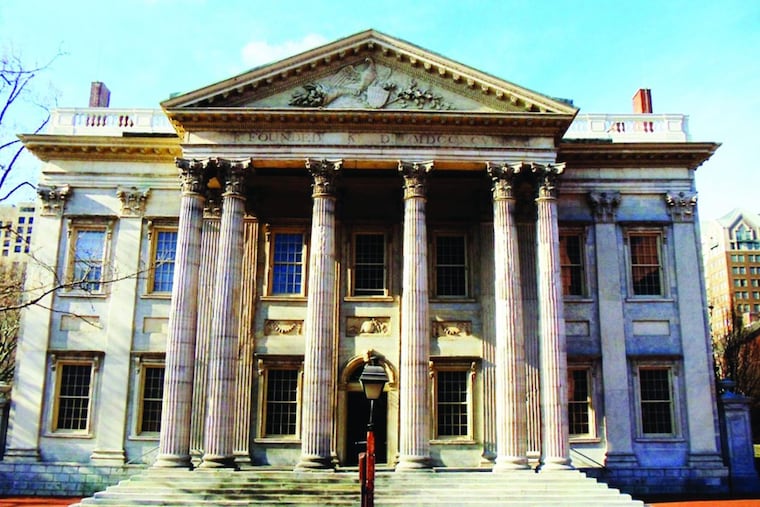Hamilton fans seek $26M to restore Philly's First Bank, Fed forerunner
"Philadelphia hasn't been telling the story of the creation of the financial system, even though we have three central banks and the Mint,"

Tom Caramanico is used to building things. The Philadelphia engineering firm he headed, McCormick Taylor, built and rebuilt projects as diverse as the Blue Route, professional sports stadiums, and federal buildings.
Now he's taken on a massive restoration job: As the pro bono executive director of Friends of Independence National Historical Park, he's heading the group's Restore the First Bank effort, which is raising $26 million to restore the rundown First Bank of the United States, the imposing stone pile founded by Alexander Hamilton, the forerunner to the Federal Reserve, and later the headquarters for Stephen Girard, the immigrant millionaire and world trader who started Pennsylvania's railroad, canal, and coal industries and left his fortune to build Delaware Avenue, city ports, and Girard College.
Hamilton famously called banks "the happiest engines that ever were invented for advancing trade," and preached well-paced public debt as a road to growth and stability, Caramanico reminded members of the Bond Club of Philadelphia at the Revolutionary War Museum earlier this month. Hamilton's friend James Madison laid the intellectual groundwork for the Bank in the Federalist Papers. Hamilton won its charter from Congress in 1791. "That play that's been on Broadway? It lies. He didn't do that in New York. It was here in Philadelphia," Caramonico reminded the crowd, to appreciative laughter.
The white stone Greek Revival-style temple of money, inspired from Caribbean-born Hamilton's vision of banks in Europe, was designed to inspire confidence and guard against the fires that ravaged early American cities. Its mahogany tympanum (wood sculpture) of an eagle (with oak and stars) is one of the first artistic representations of that symbol of America. "It was a demonstration to the world that this was a country to be reckoned with."
The bank was controversial. When its charter expired in 1811, Girard bought the building, at a discount, and went on to finance the War of 1812. A Frenchman, Girard was glad to help America fight Britain while the royal forces were also struggling against Napoleon's France.
Girard was the "Andrew Carnegie, John D. Rockefeller, Bill Gates" of his day, Caramanico said. He made sure his deals were profitable for him, whatever national agenda they also advanced.
Girard kept the building after the government set up (and then again let expire) a second central bank in Philadelphia. It was updated with detailed interior woodwork after 1900, which Caramanico says will be restored, not torn out. The oldest surviving U.S. government building, it remained in use as a private bank until the eve of the Great Depression, then was acquired by the city. It was sold to the National Park Service in 1955, and has been underused since, until the success of the Hamilton play inspired Caramanico and his committee to add it back into the active inventory of the city's historic attractions.
Caramanico and his committee have worked closely with the National Park Service on plans and are raising funds at its leaders' request. "I'm thrilled to have the opportunity," Caramanico said. NPS required a feasibility study, by consultant Brent Glass, former head of the Smithsonian's National Museum of American History.
The proposal includes replacing antiquated electric systems and elevators, updating windows and doors, and preserving sculptures. The tympanum restoration is in the federal budget next year ($200,000).
Caramanico's committee includes Scott Jenkins of the colonial-era Philadelphia Contributionship insurance company; Justin Shuman of Avalon Healthcare Solutions; Mary Herzog, whose father, John, led the group that set up the Museum of American Finance in New York (and pledged $100,000 to the First Bank restoration); Suzanne Cawley (wife of former Lt. Gov. Jim Cawley); and Joyce Walker (deputy director of the Friends). Gov. Wolf wants to set aside up to $10 million in state Redevelopment Assistance Capital Program matching funds, if the legislature's Republicans agree. H.F. "Gerry" Lenfest, the philanthropist and former Inquirer owner, pledged $1 million. The Society of the Cincinnati, descended from Gen. George Washington's officers, pledged $50,000.
"Philadelphia hasn't been telling the story of the creation of the financial system, even though we have three central banks [including today's Federal Reserve Bank of Philadelphia] and the Mint," Caramanico noted. He wants the Mint to issue a commemorative coin as a First Bank fund-raiser. He's used to years-long campaigns, and knows how to speed them up. After all, "I built roads," Caramanico said.